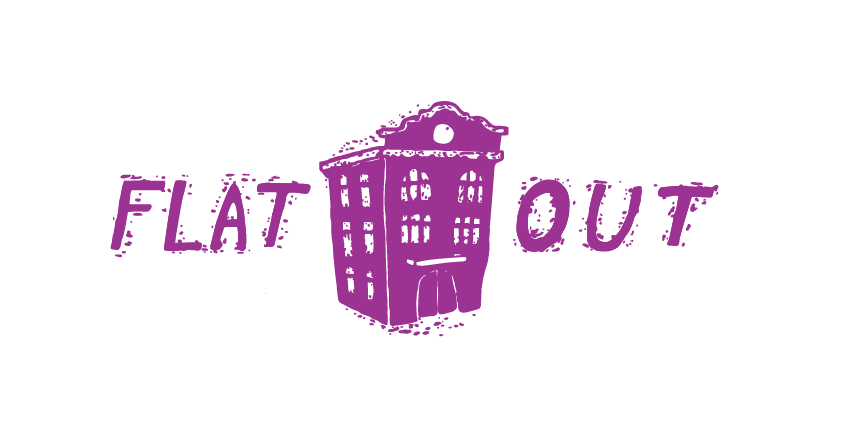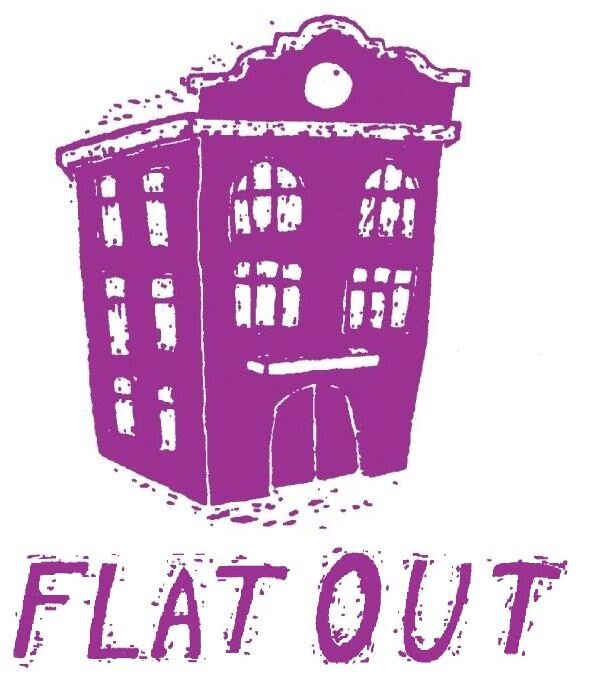Organising Against Prison Expansion: Building Collective Power Across Borders
— By Nina
Nina is the Family Violence Justice project manager at Flat Out and a founding member of the FIGJAM collective, a peer support and advocacy group of women, trans and gender diverse people who have all experiences state violence and all survived the prison system. Nina is also a Research Assistant on the Reconceptualising Risk DECRA project.
This winter, on Wednesday night June the 4th we gathered at the ballroom at Trades Hall. Catering and merchandise tables lines the walls, a cozy green room awaiting the speakers, the hall lined with rows of chairs, the lighting dim glistening the disco ball above. The stage was brightly lit, almost making the bar at the back of the room invisible.
Flat Out and People Against Prisons Aotearoa (PAPA) united in collaboration with the Reconceptualising Risk DECRA project to host an evening public lecture and panel discussion at Trades Hall in Naarm (Melbourne), followed by a research symposium at La Trobe University the next day. These events brought together activists, grassroots organisers, academics, and justice advocates to build momentum against prison expansion. With powerful voices from Aotearoa/New Zealand and Australia, these gatherings beautifully built networks of likeminded folks, strengthening relationships and shared strategies. Together we collectively imagined pathways to abolition.
Standing left to right - Emma Russell, Ti Lamusse, Nina, Stacey Stokes. Seated left to right - Betty Buckrich, Emmy Rākete, Kelly Flanagan, Zakaria Shahruddin.
Day 1 – Organising for Prison Abolition
The opening evening was described as a welcoming yet cold space (yes, Melbourne winter is brutal!) of knowledge exchange and unexpected comedy thanks to keynote speaker, Dr Emmy Rākete, a communist and prison abolitionist from Tāmaki Makaurau in Aotearoa. Emmy is the press spokesperson and co-founder of PAPA. In her research as a lecturer at the University of Auckland, Emmy uses Marxist political economy to make sense of police and prisons and guide organised class struggle against them.
Following Emmy’s lecture, I chaired a panel discussion with Emmy, Kelly Flanagan, Stacey Stokes and Ti Lamusse.
We invited introductions from panellists. First, Kelly Flanagan, a proud Wiradjuri woman formerly incarcerated and survivor of drug addiction, domestic violence and sexual assaults. Kelly is a staunch advocate for women who have had their voices taken away by prison, violence, trauma or sexual assault. Kelly is an active member of FIGJAM Collective, a self-taught artist and writer currently writing her own book about her prison journey, she also writes articles for About Time prison newspaper.
Kelly was joined on the panel by Stacey Stokes, who spent over a decade in the men’s prison system. Stacey sits on the Beyond Bricks and bars steering committee, is a FIGJAM members and works as a lived expertise advisor and writer.
Our final panellist was Dr Ti Lamusse, a prison abolitionist based in Te Whanganui-a-Tara in Aotearoa and co-founder of PAPA, a movement builder and criminology lecturer at Te Herenga Waka—Victoria University of Wellington. Ti research conditions of incarceration in New Zealand prisons, queer and trans experiences of the criminal injustice system, as well as alternative visions of justice in an Aotearoa without prisons.
Through the panel discussion, organisers and movement builders engaged in deep conversation about their collective efforts towards prison abolition and what forms of advocacy that has taken. They discussed the effectiveness of their organising and spoke of the wins but also the barriers and challenges they had faced. Importantly they addressed the nature and importance of organising to build collective power.
The evening ending with shared food, thoughts, cheers and hugs. It was lovely to be in a space to reflect as our minds felt energised.
Day 2 – Prison, Labour, Crisis
The second day we sat collectively at La Trobe City Campus with friends, family, academics and community members in attendance, in a well-lit and warm (!!) space. The day-long research symposium had a focus on critical conversations around anti-prison campaigns and issues. Chaired by Dr Emma Russell, the speakers – Dr Andrew Brooks and Dr Naama Blatman, as well as Ti and Emmy – covered emerging struggles against incarceration, strategies for mobilising broader communities, the nature of transformative justice work, and lessons from international movements.
This gathering was not just a research-focused event, it was also a call to action. It was about building transnational solidarity, amplifying voices, and challenging the expansion of carceral systems with bold, collective visions for freedom. This was done in a method where each presenter was assigned a discussant who responded to their presentations with thoughts and questions, allowing for rich discussion. My favourite was Emmy’s presentation and discussion led by Shillan Shebly who both had very different ideas and shared these in a comical and respectful manner, deepening our thoughts and reflections.
Such brilliance!!
Shillan Shebly (left) Emmy Rākete (right)



